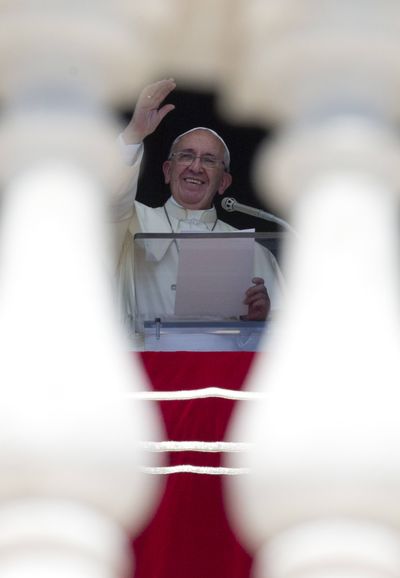Pope Francis new to U.S. in many ways
Visit will be his first ever

NEW YORK – When Pope Francis sets foot on the tarmac at Andrews Air Force Base near Washington, D.C., on Sept. 22, it won’t just be his first time in the United States as pontiff. It will be his first time in the country in his life.
The former Cardinal Jorge Mario Bergoglio of Buenos Aires, Argentina, never followed the footsteps of so many fellow Roman Catholic leaders of his rank, who sought to raise their profiles, along with funds for missions back home, by networking within the deeply influential and well-resourced U.S. church.
This gap in his resume can be explained in part by Francis’ personality. He was a homebody who loathed being away and felt an obligation to stay near the people of his archdiocese. He also famously opposed ladder-climbing, condemning what he called “airport bishops” who spend more time traveling for their own prestige or pleasure than serving their flock.
Still, Francis’ lack of firsthand experience of the U.S. stands out for many, especially those struggling to absorb his unsparing critique of the excesses of global capitalism and wondering whether this first Latin American pope harbors resentment over the history of U.S. policies in his native region.
“This trip to the United States will be the most difficult, the most challenging, and the most interesting because he’s exploring a world that for him is more foreign than Asia, than the Philippines,” where Francis traveled in January, said Massimo Faggioli, an expert in church history at the University of St. Thomas in Minnesota. “It’s not just a language barrier. It’s a cultural barrier.”
Bishop Marcelo Sanchez Sorondo, an Argentine and one of Francis’ key advisers at the Vatican, said he was aware of but disputed the perception that the pope disliked the U.S. Francis’ view that a global economic system focused on maximizing profits was destroying the poor and the environment has landed hard in a country considered the world headquarters for capitalism.
Sanchez Sorondo insisted Francis is not anti-capitalist and said the pope admires America for the principles of the Founding Fathers, who influenced the independence movement in his native Argentina. But Francis’ outlook is also shaped by another history, including U.S. ties with Latin American dictators, America’s treatment of Mexican and Central American immigrants, and long-standing U.S. policy toward Cuba, Sanchez Sorondo said. Francis recently helped negotiate a historic thaw in U.S.-Cuba relations that has led to restored diplomatic ties between the countries.
“I don’t think the pope has anything against America,” Sanchez Sorondo said in an interview in Rome. “What the pope might have is that he felt the repercussions of America in Latin America.”
This is utterly new ground as well for American Catholics, accustomed to Francis’ immediate predecessors, Popes John Paul II and Benedict XVI, who both lived through World War II, when Americans were considered liberators and generous benefactors who rebuilt the war-ravaged continent.
“Pope Francis – his cultural roots, his formation – is completely different,” Faggioli said.
In a July question-and-answer session with reporters, Francis said he would spend the weeks ahead of his U.S. visit “studying” for the trip. In the past, he had expressed some unease with the English language, but he has given well-delivered – and well-received – speeches in English before. In America, he will be making remarks both in English and Spanish.